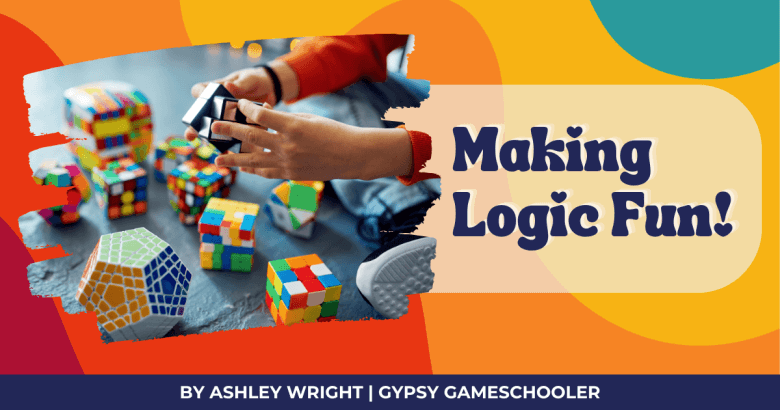By Ashley Wright of Gypsy Gameschooler
Over the years, I’ve heard a lot about logical fallacies, but I never had a chance to formally learn about them.
One of my favorite aspects of homeschooling is that I get to learn right along with my kids, so earlier this year, we learned all about logic, logical arguments, and logical fallacies.
1. Make It Special
The first way to make learning anything fun is to approach it in a special way. For my family, this means it becomes part of what we call our “evening lessons.”
Every evening after dinner is cleaned up, we all pile onto my bed and learn together. The snuggly togetherness helps to make this time special.
Acquire Background Knowledge
Since none of us had any background in logic, we started with some lessons on Khan Academy.
Khan Academy is not the most fun, but it is straightforward and easy to understand. My kids loved the videos and getting to answer the questions.
The book Sophie’s World, while more of a philosophy book, does go into logic some.
As the Khan Academy logic lessons were part of a larger philosophy course that we couldn’t help but explore a bit, we also listened to Sophie’s World.
Rather than a textbook, Sophie’s World is a captivating mystery that takes the reader through the history of philosophy.
Logical Fallacy Bingo
While we were learning about logical fallacies, I made up a quick cheat sheet for us to use while we played Logical Fallacy Bingo.
We used a political debate and an episode of Jerry Springer for this exercise. Commercials would be another good source.
We had so much fun dissecting what each person was saying and finding the fallacies! My kids were empowered to realize that adults make logical fallacies, too, and they could find them.
Sherlock Holmes
A unit on logic would not be complete without learning about Sherlock Holmes. Since my family spends a fair amount of time in the car, we listened to some of Sherlock Holmes.
It was a treat to then watch some of the various adaptations for TV! In addition to the Sherlock Holmes movies that are out right now, both Wishbone and Star Trek have episodes featuring the most famous consulting detective.
Monty Python’s Argument Clinic
Another really fun resource is Monty Python’s Argument Clinic. Of course, this led to hilarity and shouts of “that’s not an argument!” from my kids and further explorations of other Monty Python skits.
We love getting to broaden our kids’ horizons, so this was enjoyed by the whole family.
Games!
We finished our unit study with some different games. There are many one- and two-player games that require logical thinking.
Everything from classics like Chess or Mancala to newer games by ThinkFun.
Finally, I created a couple of escape rooms to test my kids’ newfound logical skills.
Start making Logic Fun!
Between all of our nightly evening lessons, books we listened to, TV shows we watched, and games we played, we probably took about a month to learn about logical arguments and fallacies.
By the end of our unit, our kids were pointing out logical fallacies everywhere. Your family can have just as much fun learning about logic, too!
Read More!
- Log in to post comments


